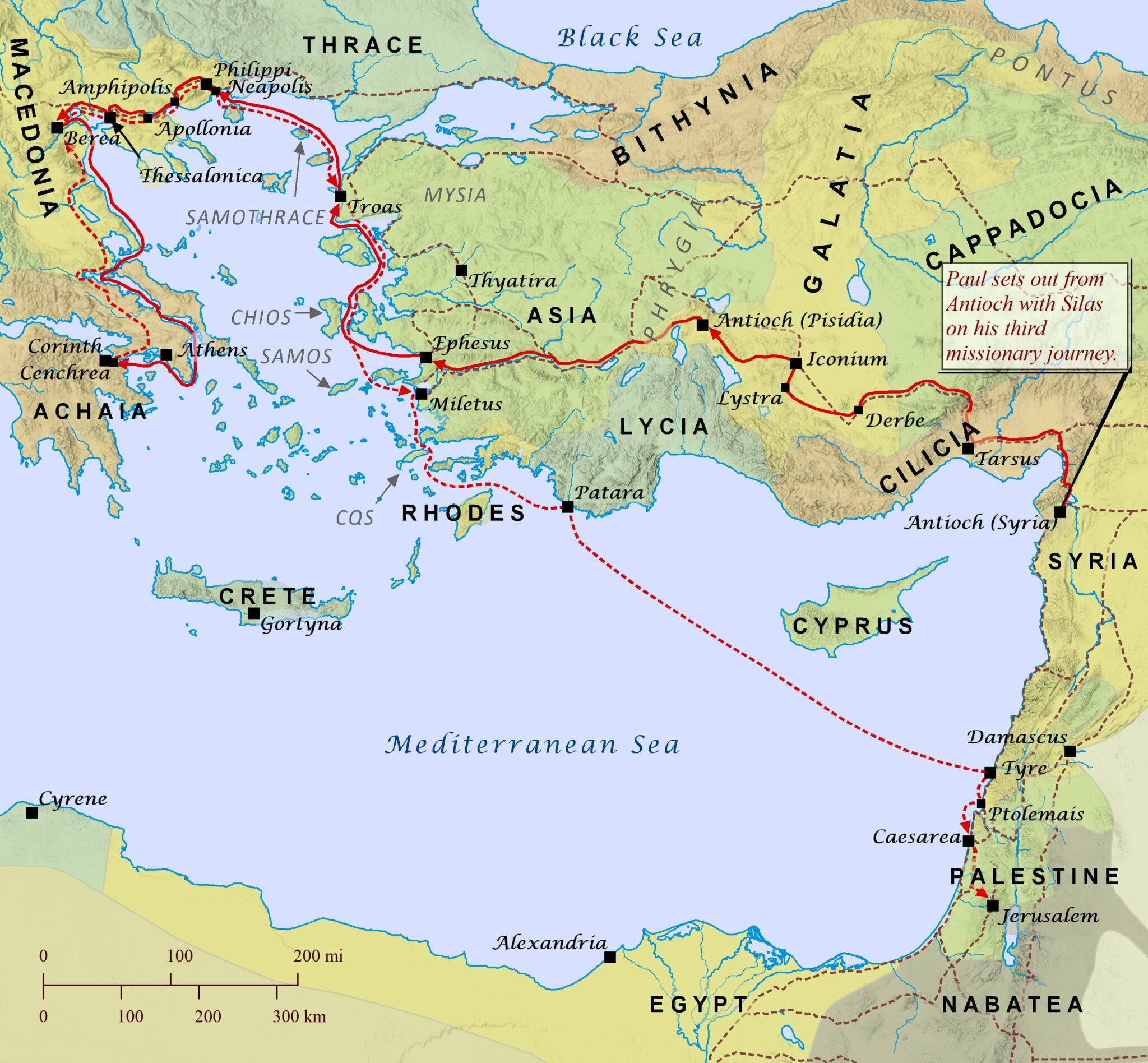We are all sinners—Jews and Gentiles. We choose to sin. Gentiles are not better than the Israelites. God has shown mercy to Gentiles, nevertheless, and for now He has set aside His people, who have rejected Him. But that does not mean He has abandoned them. God allows us the freedom of choice, but He also shows us limitless grace and forgiveness.
In Acts 26:17, Paul makes it clear that the Jews were his enemies. In fact, the story in Acts 26 includes the Jews seeking to ambush Paul and murder him. And Paul’s own testimony is that he himself was an enemy of those who followed “the Way” — the way of Jesus. He met Jesus on the road to Damascus and Jesus asked, “Why are you persecuting me?” — because Paul was persecuting His followers (Acts 9:4). Paul, a Hebrew of Hebrews, was an enemy of the gospel. But after he met Jesus he became a preacher of the gospel.
So Paul knows what he is talking about when he says of his opponents: From the standpoint of the gospel they [unbelieving Jews] are enemies for your [Gentiles] sake (v 28).
Israel has rejected God, they have disobeyed God. That does not mean God does not love Israel: but from the standpoint of God’s choice they are beloved for the sake of the fathers (v 28). God still loves them because He loved their ancestors, and made promises to Abraham, Isaac, Jacob, and David. And these promises will be kept. God’s promise to Abraham was a gift, for the gifts and calling of God are irrevocable (v 29).
Abraham was given the gift of being declared righteous in God’s sight because he believed (Genesis 15:6). Abraham was given the promise of a reward because of his obedience. God granted the land of Israel to him as an inheritance and promised that his descendants would possess it (Genesis 15:18). Paul asserts that this gift and this calling are irrevocable. The Greek word translated as calling can also be translated as “vocation.” God’s “vocation” includes making and keeping promises. So God’s promises to Abraham, David and others will be kept.
The benefit will be gained by all the descendants of Abraham’s chosen seed of Isaac (Genesis 17:21). As Paul has argued all through chapters 9–11, God’s sovereignty has allowed the Gentiles to be reconciled with God through the rejection of the Jews. The Gentiles once were disobedient to God (v 30). Because the Jewish leaders did not receive Christ as King of Israel, Jesus died on the cross and paid for the sins of the world, including Gentiles. Now Gentiles have been shown mercy because of their [Jews] disobedience (v 30). God extended His mercy. He shows compassion on whom He chooses (Romans 9:15). Gentiles are no different than the Jews. Although these also now have been disobedient (v 31), they have been shown mercy. All people, Jews and Gentiles, have been shown mercy through Jesus who died on behalf of the entire world (Romans 3:21-26).
Because of the mercy shown to [Gentiles] they [Jews] also now may be shown mercy (v 31). God allows disobedience so that He can show us mercy. For God has shut up all in disobedience so that He may show mercy to all (v 32).
Here is the paradox of God and salvation, that we as humans were allowed the freedom to fall away from Him, Jew and Gentile. We fell, and Jesus came to redeem us. Even after we are given new birth in Christ, we are still free to sin. And yet God has called us to be His, to show mercy to us, to give grace and deliverance from our sinful past and our sinful nature.
We can sin, the Jews presently are in sin and have rejected their God, but God’s gifts and calling are irrevocable. His grace will always abound. His mercy is limitless. We cannot out-sin the grace of God. As Paul states in 2 Timothy:
“If we are faithless, He remains faithful, for He cannot deny Himself.”
(2 Timothy 2:13)
Because each believer is placed into the Body of Christ, if God denied any of His children as being His, He would be denying Himself. Even if we are faithless, He remains faithful. Sin still adversely affects us, which is why Paul admonishes us not to sin in order to avoid its adverse consequences. But it does not affect the gifts and calling of God—for they are irrevocable (Romans 8:29).
Biblical Text
28 From the standpoint of the gospel they are enemies for your sake, but from the standpoint of God’s choice they are beloved for the sake of the fathers; 29 for the gifts and the calling of God are irrevocable. 30 For just as you once were disobedient to God, but now have been shown mercy because of their disobedience, 31 so these also now have been disobedient, that because of the mercy shown to you they also may now be shown mercy. 32 For God has shut up all in disobedience so that He may show mercy to all.
Check out our other commentaries:
-
1 Thessalonians 5:1-7 meaning
Jesus will return unexpectedly, so believers should always be ready for His arrival....... -
Matthew 21:18-19 meaning
In the morning after Jesus’s triumphal entry, Jesus travels back to Jerusalem from where He spent the night in Bethany. He becomes hungry and sees...... -
Deuteronomy 22:23-27 meaning
Moses described what to do about sexual infidelity committed by a virgin who was engaged to be married....... -
Deuteronomy 24:6 meaning
Moses told the Israelites that they could not take a handmill or an upper millstone as collateral for a loan....... -
1 Samuel 8:6-9 meaning
Samuel is unhappy that Israel wants a king, so he prays to God for guidance. God assures Samuel that Israel is rejecting Him, not Samuel.......



